10 Best Places for Camping in Georgia — From the Blue Ridge Mountains to the Barrier Islands
Here's what you need to know about camping in Georgia.
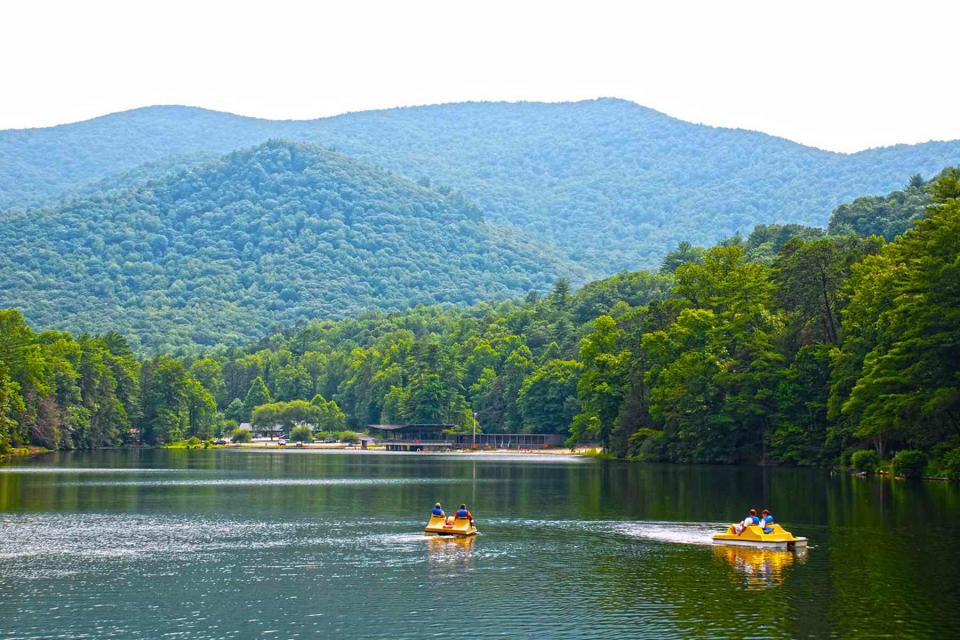
Courtesy of Georgia State Parks
Georgia is a fabulous destination for camping, thanks in part to the Peach State's varied landscape. To the north, there's the Appalachian Mountains, where pretty plateaus and cool canyons abound. The coastal plains to the south are worth a visit, too — you can even camp on a barrier island, with the sea right at your fingertips. Stunning and well-maintained state parks, two national forests, gorgeous beaches, and a moderate climate make hiking, fishing, boating, and wildlife-watching adventures possible year-round. But before embarking on a Georgia camping adventure, it's good to know the following vital information. Use this guide to better understand Georgia’s camping season and it's best campgrounds. We'll also teach you all about boondocking — you can thank us later.
What to Know About Camping in Georgia
If you're new to camping in Georgia, note that you will likely get the most out of your experience if you camp in September and October, when the days are warm, the nights cool, and the summer crowds have dissipated. Also important to know is that Georgia has a relatively liberal approach to camping. Dispersed camping, or camping in undeveloped areas, is allowed in many places, especially rural ones. You can also legally boondock — that's camping in an RV without hookups to electricity, water, or sewage. Should you prefer to camp with some creature comforts, opt for a campground that has all the necessary amenities.
Best Campgrounds in Georgia
Cloudland Canyon State Park
In northwest Georgia, you’ll find sandstone cliffs, caves, waterfalls, and woodlands in Cloudland Canyon. Stay at one of 30 walk-in campsites scattered amid oak trees and mossy outcrops. This is also a great home base from which to hike to the park’s two waterfalls: Cherokee Falls and Hemlock Falls. Considered the best place to camp in the state, park campsites here come with a dirt tent platform, a picnic table, and a stone campfire ring. There's also fresh water, showers, and clean restrooms.
Skidaway Island State Park
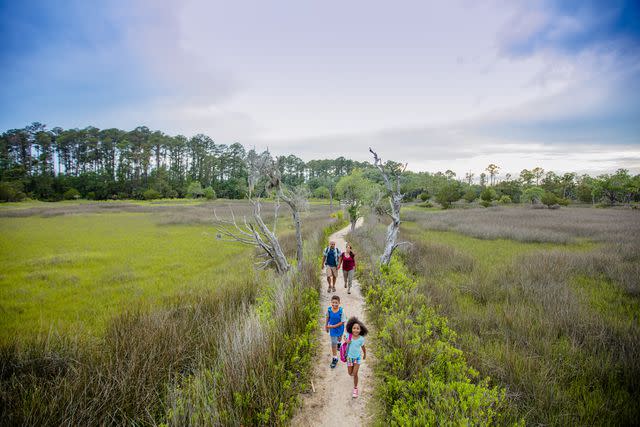
Courtesy of Georgia State Parks
Camping at Skidaway Island State Park is all about the amenities: fresh drinking water, flush toilets, hot showers (for a small fee), three playgrounds, outdoor fitness equipment, and a volleyball court. Just a 25-minute drive from historic Savannah, the campground borders Skidaway Narrows, a part of Georgia’s Intracoastal Waterway where you're sure to spot wildlife like deer, fiddler crabs, and egrets as your traverse through maritime forest and along salt marsh hiking trails. Afterward, relax at your spacious campsite, admiring the Spanish moss and live oaks.
Vogel State Park
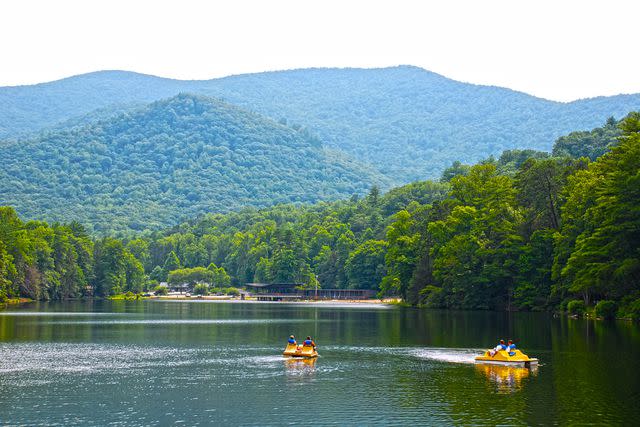
Courtesy of Georgia State Parks
One of many fantastic camping destinations in Southeast Georgia’s Chattahoochee National Forest, Vogel State Park was founded in 1931 and gives campers access to miles of Blue Ridge Mountain hiking trails. Short loops are easy on little legs, and if you and your family aren’t inclined to hike, there’s always putt-putt golf, kayaking, paddleboarding, and pedal boat rentals to entertain you. The fall foliage is particularly spectacular here, too.
Mistletoe State Park
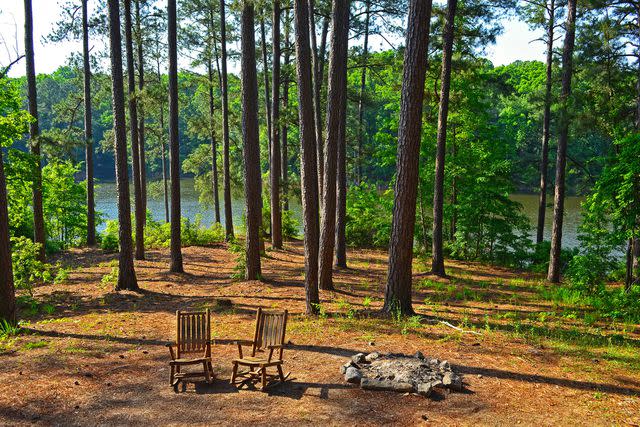
Courtesy of Georgia State Parks
Mistletoe State Park is all about the bass — largemouth bass, spotted bass, and striped bass that is. All of these, plus crappie, bluegill, and catfish, are found in Clarks Hill Lake. Buy a Georgia fishing license if you'd like to try your luck at catching some. Set up camp on the peninsula for next-level lake views and easy swimming access, or rent a canoe or pontoon boat to explore the lake's surface. Back at camp, keep an eye out in the evenings for foraging armadillos.
Sea Camp Campground
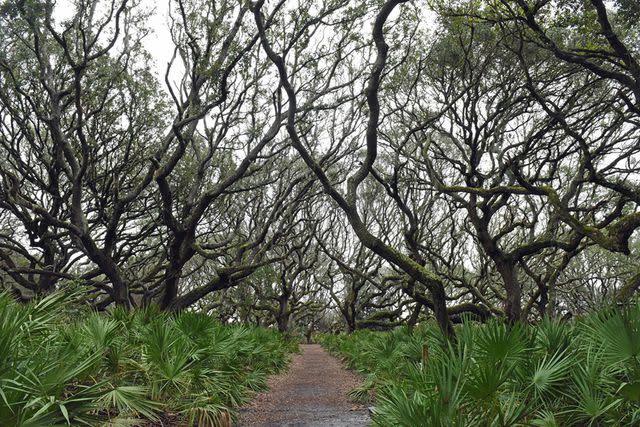
Courtesy of National Park Service
Sea Camp Campground is one of the best beach camping spots in the country. For a start, it’s located on Cumberland Island National Seashore, Georgia’s southernmost barrier island and a designated wilderness area with undeveloped beaches, historic ruins, and critical wildlife habitats. It's also special in its secludedness: You can only access this place via a 45-minute ferry or private boat ride. Add in the campground’s modern amenities (treated drinking water, showers, and toilets), and it becomes obvious why locals and out-of-staters love overnighting here.
Tallulah Gorge State Park
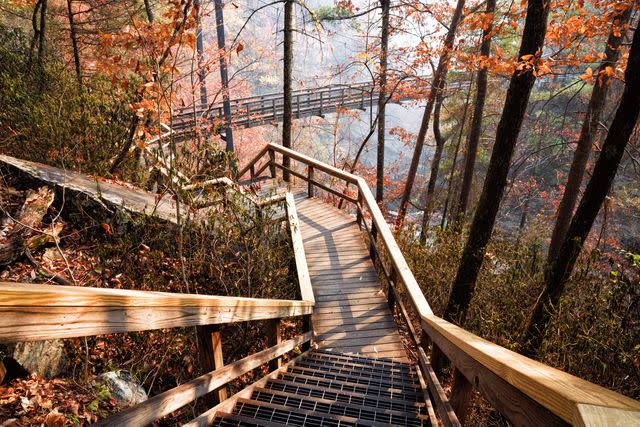
LCBallard/Getty Images
Use this 50-site campground near Atlanta as a jumpoff for exploring Tallulah Gorge and its waterfalls. If you’re feeling bold, rock climbing and whitewater kayaking are also possible here. Visitors can also trek to natural waterslide Slide Rock from here by crossing a suspension bridge and scrambling down to the bottom of the gorge. Note that a permit is needed for this excursion. If you prefer, hike rim trails, go fishing, or view the metamorphic rock from accessible overlooks instead.
Amicalola Falls State Park & Lodge
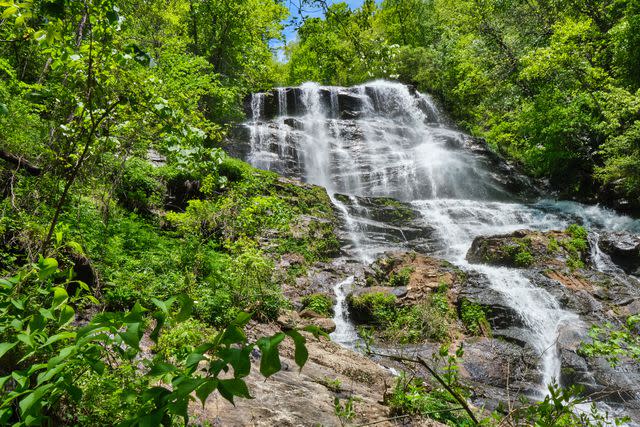
David Graves/Getty Images
You can tent or RV camp in Amicalola Falls State Park & Lodge within Chattahoochee-Oconee National Forest. Campsites come with water, power, grills, and fire rings; laundry facilities, ADA-accessible restrooms, and showers are other amenities. The park is near the Appalachian Trail and the 729-foot Amicalola Falls — Georgia's tallest cascading waterfall and one of the state's most prized natural sights.
Okefenokee National Wildlife Refuge
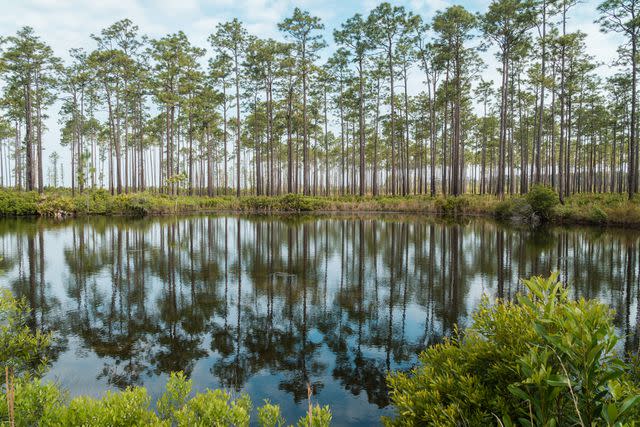
HABesen/Getty Images
"Canoe camping" is the thing at Okefenokee Swamp — instead of hiking or driving your gear in and out of a campsite, you've got to paddle them to your overnight accommodations. Seven roofed overwater platforms and two island campsites help you fully embrace your natural surroundings, as do the pit toilets. Be sure to obtain wilderness camping permits up to two months in advance of your trip.
Stephen C. Foster State Park
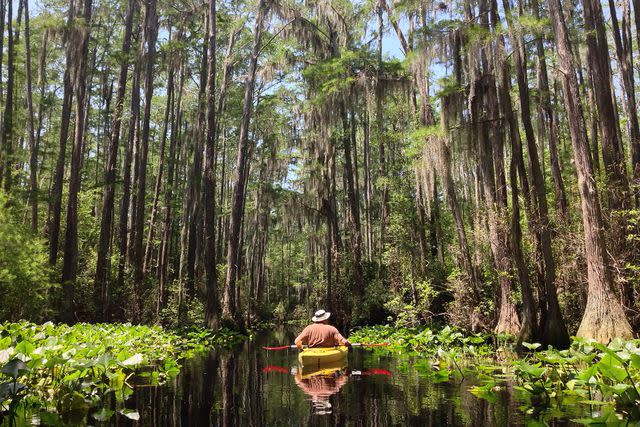
Courtesy of Georgia State Parks
For a really remote experience — think limited cell service and no easy access to groceries — choose Stephen C. Foster State Park. Expect 63 tents, trailers, and RV campsites here, plus terrific stargazing in this designated Dark Sky Park. Animal lovers will appreciate the location, too, as nearby Okefenokee Swamp is the ideal habitat for spring peepers, pig frogs, cicadas, grey foxes, alligators, owls, turtles, black bears, deer, ibis, herons, wood storks, and red-cockaded woodpeckers — and that's just a fraction of the fauna that call this magical place home.
Indian Springs State Park
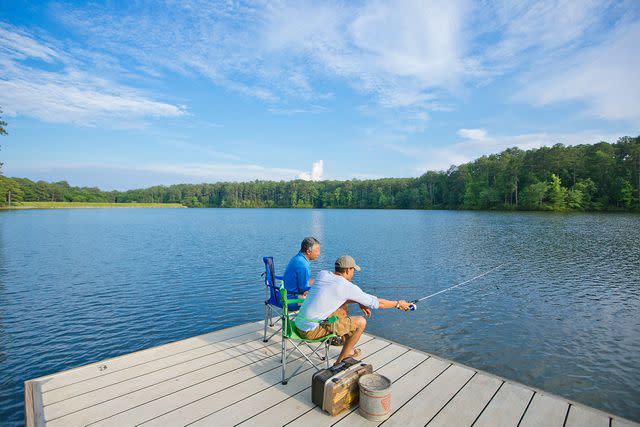
Courtesy of George State Parks
For centuries, Muscogee Creek Native Americans used the sulfuric water from regional springs here for its healing properties. Today, visitors can sample the spring water inside the stone Spring House. You can stay at quaint campgrounds adjacent to the lake, where ample water activities are available, including fishing, kayaking, and swimming.
For more Travel & Leisure news, make sure to sign up for our newsletter!
Read the original article on Travel & Leisure.

